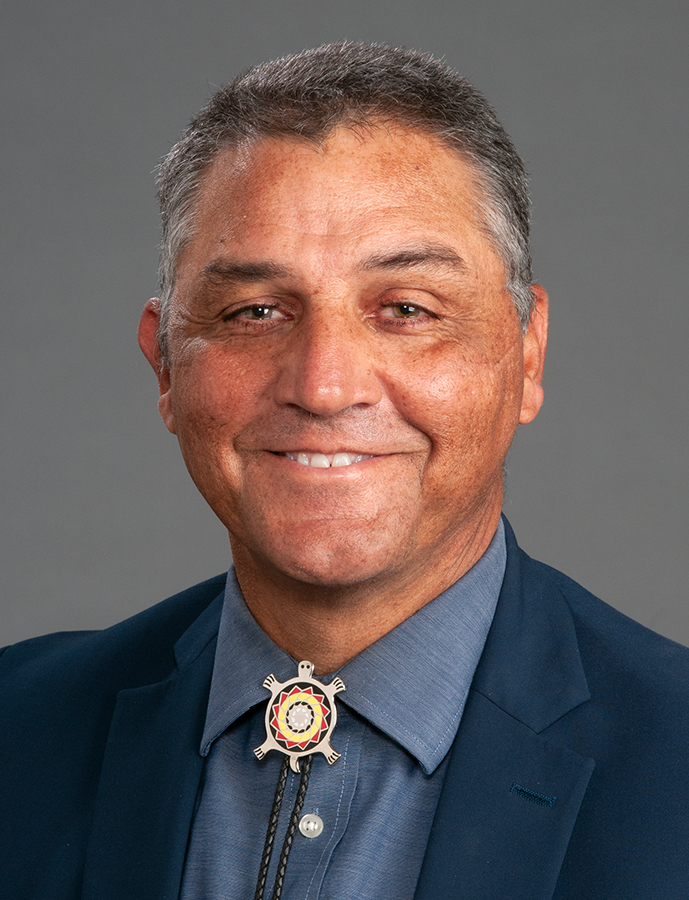
From his first paying job cleaning and closing a local laundromat in Pembroke, North Carolina, to his current position as chair of the Division of the Pharmaceutical Outcomes and Policy in the Eshelman School of Pharmacy, Ronny Bell, PhD, MS, continues to serve his community and give back to the native population that he cares for deeply, personally and professionally.
Here’s a few minutes with Ronny Bell.
Tell us about your journey to this point in your career
I am a native of Pembroke in Robeson County, North Carolina, where I grew up in the tribal homeland of the Lumbee tribe (I am an enrolled member of the Lumbee tribe). After graduating from Pembroke High School, I came to UNC-Chapel Hill and completed a Bachelor of Science in public health nutrition. Afterwards, I attended UNC Greensboro where I completed a master’s and PhD in foods and nutrition. After graduation, I completed a postdoctoral fellowship in Gerontology and completed a master’s degree in epidemiology at the Wake Forest School of Medicine.
I started at UNC-Chapel Hill in January 2023. I was recruited to be the chair of the Division of the Pharmaceutical Outcomes and Policy in the Eshelman School of Pharmacy. In my recruitment, I was graciously offered the opportunity to serve as a senior advisor at UNC Lineberger, working with the Lineberger Equity Council, the Community Outreach and Engagement Program and the Population Sciences Program. I also have the privilege of working as an advisor with the UNC American Indian Center.
Recently, Dr. Earp appointed me as the Associate Director of Cancer Care Access & Excellence. I will be stepping in to the role that was previously held by Dr. Wendy Brewster prior to her passing. I co-lead the Southeastern American Indian Cancer Health Equity Partnership (SAICEP) with Stephanie Wheeler, PhD, MPH, along with our partners at the Duke Cancer Institute and the Atrium Health Wake Forest Baptist Comprehensive Cancer Center.
Prior to coming to UNC, I was the associate director of Community Outreach and Engagement and director of the Office of Cancer Health Equity at the Atrium Health Wake Forest Baptist Comprehensive Cancer Center (2020 – 2022). I was also the chair in the Department of Public Health in the Brody School of Medicine at East Carolina University (2016 – 2020), where I was also the associate director of the ECU Center for Health Disparities. I started my academic career at the Wake Forest School of Medicine, where I was on the faculty in the Department of Epidemiology in the Division of Public Health Sciences (1996 – 2016), and, from 2006 – 2016, I was the director of the Maya Angelou Center for Health Equity at Wake Forest.
Why did you decide to pursue this career, and in particular, cancer disparities?
I have always been interested in understanding health disparities and developing strategies to address those disparities. Over the course of my career, I have focused my work on diabetes, oral health, health behaviors, and, most recently, cancer disparities, particularly rural and American Indian populations. Cancer is a leading cause of death in our country and causes significant physical, emotional and financial challenges. My father died from cancer in 2017, and that was a wake-up call for me that made this more personal.
How does your position support the overall mission of the cancer center?
UNC Lineberger is committed to providing the highest quality cancer care for patients across the state, and understanding factors that contribute to cancer disparities and developing strategies to address these disparities. I am happy to be a part of this mission through our work with the American Indian communities in our state and through the efforts to promote diversity, equity and inclusion through the Lineberger Equity Council.
What is your most memorable moment at UNC Lineberger/or in your career thus far?
My appointment as associate director of Diversity, Equity and Inclusion is a tremendous honor, and I am grateful to Dr. Earp and the UNC Lineberger leadership for having the faith in me to lead this very important initiative.
What was your very first job?
My very first academic job was as a research assistant professor in the Department of Epidemiology at the Wake Forest University School of Medicine. My first paying job was to clean up and close a local laundromat in Pembroke when I was in high school.
What helps keep you motivated?
I am motivated by the importance of the work that we are doing at UNC Lineberger and the Southeastern American Indian Cancer Health Equity Partnership collaboration. I know that we are making a difference in the communities that we are serving. I am also motivated by the support of the wonderful Lineberger leadership and the opportunity to work with outstanding colleagues.
